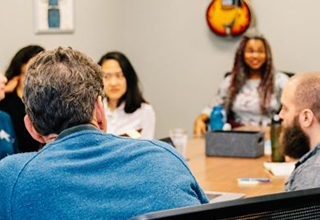The best live events, whether a gala, conference, or product launch, take guests on a journey and offer an array of experiences. None of that happens by accident. Behind every successful event is an executive producer who has considered every aspect in detail, working for months or sometimes years with a huge team of creatives and planners. It’s an amazingly complex undertaking that holds some important lessons for anyone involved in a creative process, including thought leadership.
Chicago-based executive producer Carrie Kennedy has been the catalyst and creative spark behind a diverse range of live events—from large-scale, multiday conferences such as Chicago Ideas Week to private parties that treat guests to one-of-a-kind experiences, sometimes capped off by the biggest names in popular music. In this interview, she shares her insights on the importance of collaboration and how to be an effective thought partner to clients.
Scott Leff: A lot of people have seen the title “executive producer” and may have a vague idea of what the role entails, but how would you define it?
Carrie Kennedy: It means something different depending on what part of the industry you’re working in and how you approach the work. An executive producer is an orchestrator, creative lead, translator, catalyst, and problem solver.
On a typical project, the first step involves defining what the client’s goals are, the target audience, and the project’s intention and purpose.
Once that’s established, I spend a lot of time coming up with a plan and approach and imagining what the project could be. I articulate it in a way that the client can understand to make sure that my concept aligns with their vision. And then it’s a matter of putting the right people in the right chairs on the team, striking the right tone and energy for the project. In that way, it’s like collaging, where you’re putting lots of different pieces together to create a larger, hopefully beautiful and impactful vision.
There are also logistical, operational, and financial aspects. How do you actually get it done? How much money and time does it take? How many people? The math and choreography of it all, which is also a lot of fun to figure out.
Leff: Your roots are in theater. How do those experiences inform your approach?
Kennedy: Everything I do ties directly back to theater. I’m a firm believer in the power of collaboration. I wholeheartedly believe that we can go further together than any of us could alone. That comes directly from my theater experience, except instead of creating worlds on stage that are witnessed I am creating worlds that are experienced.
I made a point of learning all the aspects of my industry and doing all the different jobs before I started producing. That makes me better at my job. I know what my team members need to do their work well and I have a shared vocabulary with them. That can make collaboration more fun, more full contact, which pushes everyone harder and further. It also has given me confidence, so I am never afraid to ask a silly question. More times than not, asking that question will reveal a miscommunication or assumption that can be teased out and discussed.
Leff: Both of our lines of work depend on being a good collaborator. How do you create an environment that promotes collaboration?
Kennedy: You have to let yourself be vulnerable, which can be so hard. You have to be a good listener, not take yourself too seriously. You must be fearless and not get stuck too firmly on any one piece of your idea, because it can block you from hearing another voice at the table whose idea is better.
For me, the real trick of the process of collaboration is leaving enough space, time, and energy for that process and exploration and then knowing when to push forward. It’s knowing when you’ve gone as far as you can with the collaboration and when it is time to start making decisions. At a certain point, it has to become a dictatorship, and I am the dictator.
Leff: Your clients are smart, established, powerful people who are used to getting their way. How do you gain their confidence so that they view you as a true thought partner?
Kennedy: With events, most people just don’t really know how many moving pieces there are, how complex the systems are, and how many people it takes to create a live event. So, when I am doing my job well, I am helping them understand the process and the thinking behind the decisions I am making. If I am successful at that, they become a collaborator.
Part of that process is getting an understanding of how much and when they want to be involved and making the process transparent and comfortable. Once that understanding is in place and expectations are clear, you get to the fun stuff. You create great experiences that they can be proud of, that they have fun creating, and that strengthens your relationship with them.
Leff: Describe the process you follow to translate a client’s vision into reality.
Kennedy: Sometimes all I get is a single word or feeling; sometimes I get a full brief that outlines goals and metrics and everything in between. Once I have sussed out the basics, like purpose and intention, goals and audience, an idea of time and money, I talk with them about the vibe and energy and how they want the audience to feel and what they want them to be thinking when they are leaving.
From there, I’ll do a short brief and send it to everybody I’m going to collaborate with to start dreaming and scheming about what the event could be. And we do a session. All these players will bring images, poetry, music, all kinds of things to the table that in their minds connect to the project in some way. And from there, we come up with a collage and a road map for how to get to where we are going.
Once you know what kind of world you’re building, then you can start focusing on the details. What exactly does it look like? How does the event move? What’s the journey? How are we reaching people emotionally? How does the energy in the room ebb and flow? Where are the points of rest? Where can people find intimate moments? How do we keep surprising them? It’s all of these different things.
Leff: What energizes you about being an executive producer?
Kennedy: Man, I am so fortunate. It is something different every day—really, every hour. I have great working relationships with a really diverse group of clients doing all sorts of crazy and smart things. I also have the most amazing people to work with. I could not do what I do without them. They constantly challenge me to grow and stretch.
I try to focus on projects that are important and will move people in some way. I have so much riding on every project that it’s really important for my work to make some kind of difference in the world. And that could simply be something that’s beautiful, that brings joy into the world, or that makes people look at or think about something differently. I think that’s a worthwhile venture. Helping people connect with one another—that’s a great thing.




Leave a Reply
You must be logged in to post a comment.